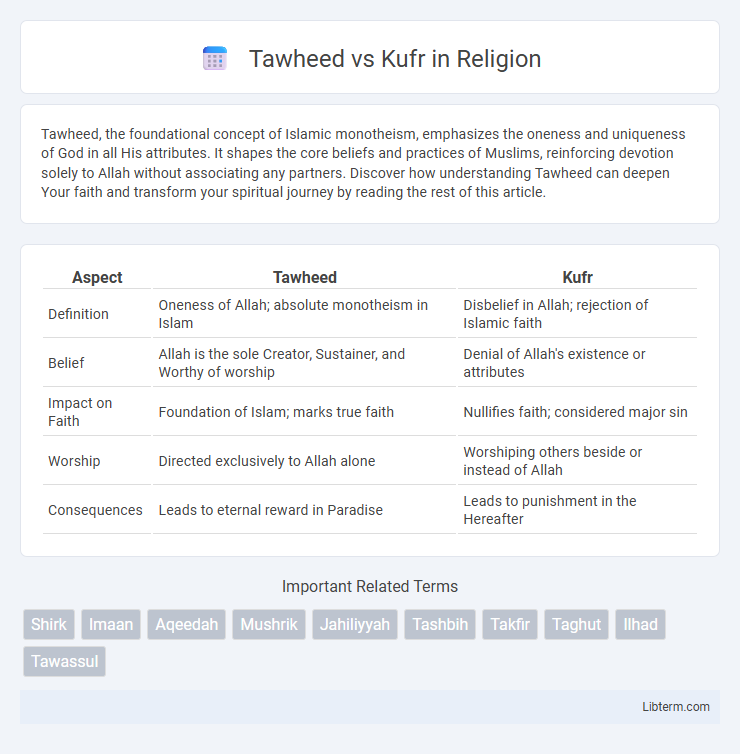Tawheed, the foundational concept of Islamic monotheism, emphasizes the oneness and uniqueness of God in all His attributes. It shapes the core beliefs and practices of Muslims, reinforcing devotion solely to Allah without associating any partners. Discover how understanding Tawheed can deepen Your faith and transform your spiritual journey by reading the rest of this article.
Table of Comparison
| Aspect | Tawheed | Kufr |
|---|---|---|
| Definition | Oneness of Allah; absolute monotheism in Islam | Disbelief in Allah; rejection of Islamic faith |
| Belief | Allah is the sole Creator, Sustainer, and Worthy of worship | Denial of Allah's existence or attributes |
| Impact on Faith | Foundation of Islam; marks true faith | Nullifies faith; considered major sin |
| Worship | Directed exclusively to Allah alone | Worshiping others beside or instead of Allah |
| Consequences | Leads to eternal reward in Paradise | Leads to punishment in the Hereafter |
Defining Tawheed: The Foundation of Islamic Monotheism
Tawheed, the foundation of Islamic monotheism, asserts the absolute oneness of Allah, encompassing His unique attributes and exclusive right to be worshipped. It categorically rejects any form of polytheism, idolatry, or association of partners with Allah, which are defined as Kufr, or disbelief. This core doctrine shapes the Muslim faith by emphasizing pure monotheistic belief as essential for salvation and spiritual integrity.
Understanding Kufr: Rejection and Its Forms
Kufr refers to the rejection or denial of the core tenets of Tawheed, which is the Islamic concept of monotheism and the oneness of Allah. This denial can manifest in various forms, including disbelief in Allah's existence, associating partners with Him (shirk), or rejecting the Prophethood and divine revelations. Understanding the nuances of Kufr is essential for distinguishing between outright disbelief, hidden disbelief (kufr khafi), and actions or beliefs that invalidate one's faith.
Core Differences Between Tawheed and Kufr
Tawheed, the fundamental Islamic concept of monotheism, asserts the oneness of Allah in worship, essence, and attributes, emphasizing exclusive devotion to Him alone. Kufr represents disbelief or rejection of Tawheed, encompassing polytheism, associating partners with Allah, or denying His existence and commands. The core difference lies in Tawheed affirming Allah's unique divinity and sole right to worship, while Kufr undermines or denies these principles entirely.
The Importance of Tawheed in Islamic Belief
Tawheed, the absolute oneness of Allah, is the foundation of Islamic belief, distinguishing true faith from kufr, or disbelief. Embracing Tawheed affirms Allah's exclusive right to worship, rejecting any form of polytheism or associating partners with Him. This unwavering monotheism shapes a Muslim's identity and guides all aspects of life, underscoring its paramount importance in Islam.
Manifestations of Kufr in Daily Life
Manifestations of Kufr in daily life include rejecting the oneness of Allah (Tawheed) through associating partners (shirk), disbelief in the core tenets of Islam, and openly defying divine commands. Acts such as idol worship, denial of prophetic messages, and engaging in practices that contradict Islamic creed clearly illustrate kufr. Consistent neglect of acknowledging Allah's sovereignty and attributing divine attributes to other than Him underscores the practical expression of kufr in everyday behavior.
Consequences of Upholding Tawheed
Upholding Tawheed solidifies a believer's spiritual foundation, ensuring eternal salvation and closeness to Allah as emphasized in the Quran (Surah Al-Ikhlas 112). It fosters a life of moral integrity, unity among the Ummah, and protection from the punishment of Kufr, which leads to eternal damnation (Surah An-Nisa 4:48). Embracing Tawheed cultivates inner peace, purpose, and divine guidance that safeguards against shirk and disbelief.
The Dangers and Implications of Kufr
Kufr, defined as the rejection of Tawheed--the fundamental Islamic concept of monotheism--poses severe spiritual consequences, threatening an individual's faith and eternal salvation. It leads to the severance of the essential relationship between the believer and Allah, resulting in misguidance and loss of divine mercy. The implications extend to social and moral decay within communities, fostering a departure from ethical principles and promoting disbelief that endangers societal harmony.
Strategies to Strengthen Tawheed in Practice
Implementing consistent daily acts of worship such as salah, dhikr, and sincere dua solidifies Tawheed by reaffirming the oneness of Allah in a believer's life. Surrounding oneself with knowledgeable scholars and engaging in Islamic studies enhances understanding and counters doubts that lead to Kufr. Maintaining strong community ties and practicing gratitude further fortify Tawheed, creating spiritual resilience against disbelief.
Common Misconceptions about Tawheed and Kufr
Many people mistakenly believe Tawheed solely means acknowledging God's existence, while it fundamentally involves recognizing His oneness in worship, attributes, and lordship. Kufr is often misunderstood as mere disbelief; it also includes knowingly rejecting or associating partners with Allah, which directly opposes Tawheed. Clarifying these distinctions is essential for accurately understanding Islamic monotheism and the gravity of kufr in theological contexts.
The Role of Tawheed and Kufr in the Afterlife
Tawheed, the belief in the oneness of Allah, is fundamental in Islam and determines a believer's eternal fate in the afterlife, promising paradise for those who uphold it sincerely. Kufr, the rejection or denial of Tawheed, is considered a grave sin leading to punishment and eternal separation from Allah in hell. The balance between Tawheed and Kufr decisively shapes the soul's destiny, underscoring their critical roles in Islamic eschatology.
Tawheed Infographic

 libterm.com
libterm.com